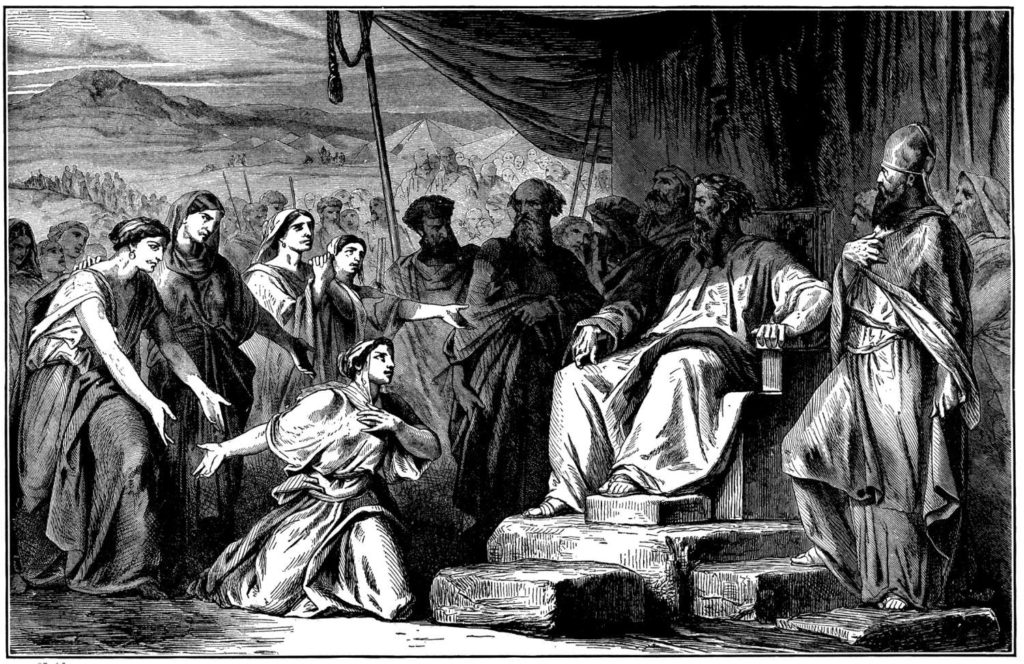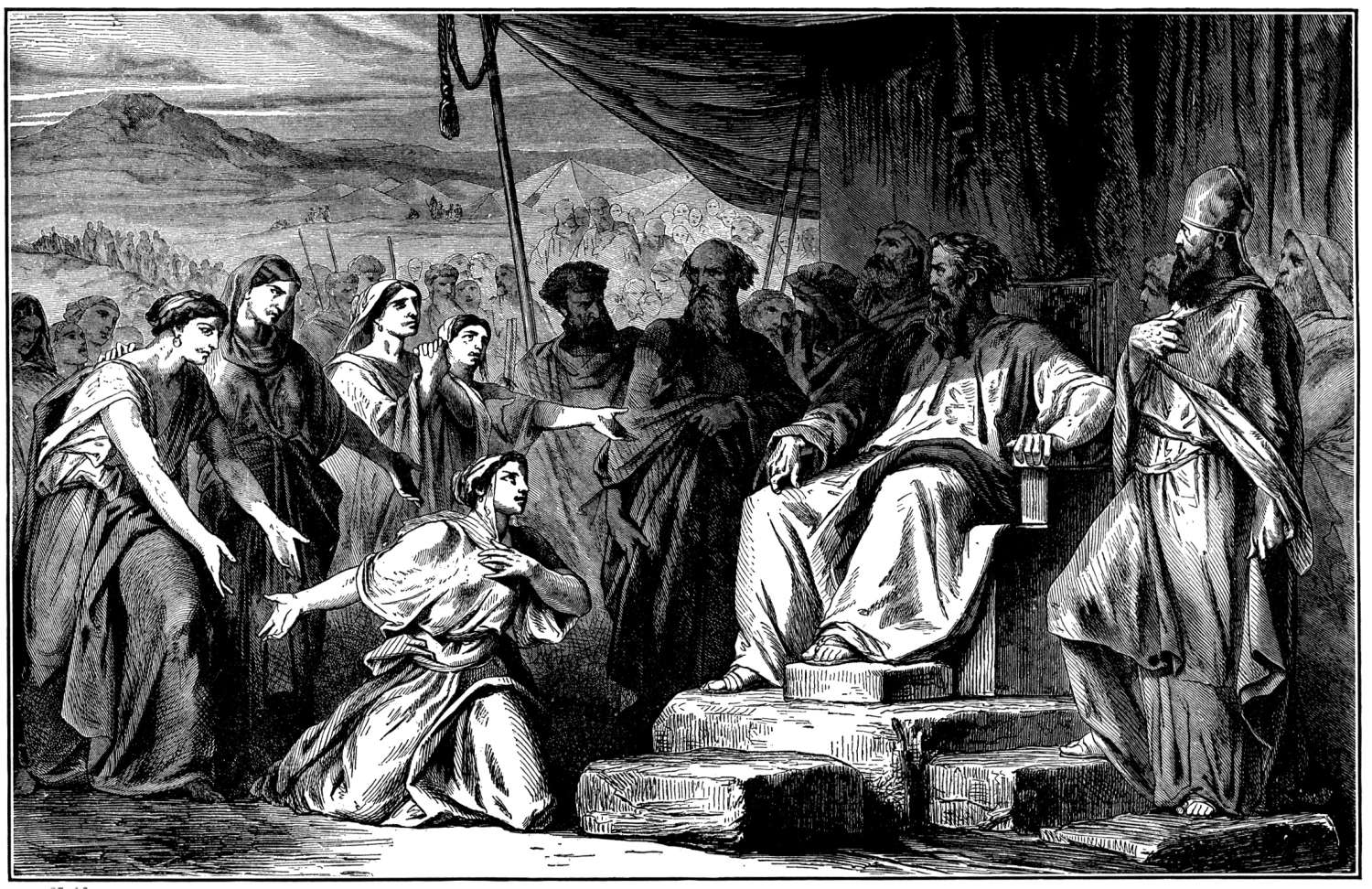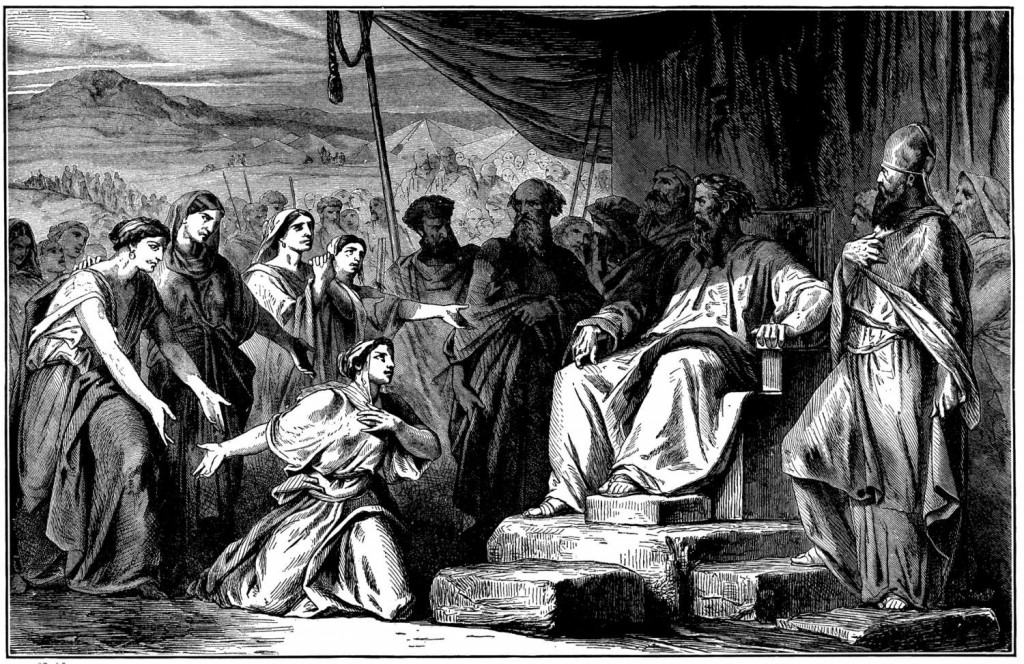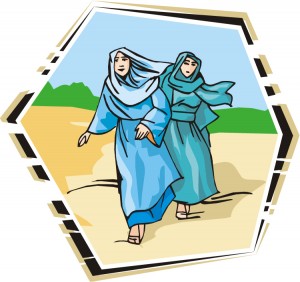Tag Archives: Daughters of Zelophehad
The Daughters of Zelophehad Help to Add to the Torah

Numbers 27:1–11, The daughters of Zelophehad. A Torah Commentary For Our Times/ATCFOT (UHAC Press, NY, 1993) has an interesting discussion regarding the incident involving the daughters of Zelophehad (Num. 27:1–11) that may answer some questions that contemporary women have regarding the Torah’s view of women. “Modern commentator Jacob Milgrom contrasts ancient Israelite practices of inheritance with those of their neighbors.” He notes that the practice of equality of inheritance between sons and daughters was upheld in Egypt and Mesopotamia one thousand years before the codification of the Torah. Later on the Greeks can be added to this list of countries that practiced “equal rights.” Milgrom then asks, “In face of such ‘equality’ of treatment how then are we to explain the fact that the Bible gives women no inheritance rights except in the case where there are no sons?” Does the Torah seem to discriminate against women regarding the inheritance of land and property from the estates of their parents, he asks? (p. 80).
“Milgrom suggest that in contrast to ancient Israel’s neighbors…where ‘centralized urban societies’ already existed, the early Torah laws of the Israelites reflect a nomadic-clan structure. In such a society ‘the foremost goal of its legal system was the preservation of the clan.’ Equity between members of the tribe or family preserves peaceful relationships and strengthens cooperation between all person.” He goes on to say that this explains the justness of the pleas of the daughters of Zelophehad where the principle of upholding the clan is preserved. The Torah sees that the daughters receive their father’s inheritance and at the same time that the clan and father’s name are preserved. (ibid.)
This solution does not promote equal rights, as we know it today, with sons regarding inheritance. Both the Torah and Talmud teach that in most cases inheritance of property is from father to son and that women share the lot of their husbands and do not inherit from their fathers (ibid., quoting from JPS Commentary: Numbers, pp. 482–484).
Continue readingThe Daughters of Zelophehad and Equal Rights for Woman
Numbers 27:1–11, The daughters of Zelophehad. A Torah Commentary For Our Times/ATCFOT (UHAC Press, NY, 1993) has an interesting discussion regarding the incident involving the daughters of Zelophehad (Num. 27:1–11) that may answer some questions that contemporary women have regarding the Torah’s view of women. “Modern commentator Jacob Milgrom contrasts ancient Israelite practices of inheritance with those of their neighbors.” He notes that the practice of equality of inheritance between sons and daughters was upheld in Egypt and Mesopotamia one thousand years before the codification of the Torah. Later on the Greeks can be added to this list of countries that practiced “equal rights.” Milgrom then asks, “In face of such ‘equality’ of treatment how then are we to explain the fact that the Bible gives women no inheritance rights except in the case where there are no sons?” Does the Torah seem to discriminate against women regarding the inheritance of land and property from the estates of their parents, he asks? (p. 80).
“Milgrom suggest that in contrast to ancient Israel’s neighbors…where ‘centralized urban societies’ already existed, the early Torah laws of the Israelites reflect a nomadic-clan structure. In such a society ‘the foremost goal of its legal system was the preservation of the clan.’ Equity between members of the tribe or family preserves peaceful relationships and strengthens cooperation between all person.” He goes on to say that this explains the justness of the pleas of the daughters of Zelophehad where the principle of upholding the clan is preserved. The Torah sees that the daughters receive their father’s inheritance and at the same time that the clan and father’s name are preserved. (ibid.)
This solution does not promote equal rights, as we know it today, with sons regarding inheritance. Both the Torah and Talmud teach that in most cases inheritance of property is from father to son and that women share the lot of their husbands and do not inherit from their fathers (Ibid., quoting from JPS Commentary: Numbers, pp. 482–484).
The Jewish sages further note that though the daughters aired their complaints about what they perceived to be an unjust situation, they nonetheless did so in a respectful and organized (not rebellious, loud, boisterous or aggressive) manner. They calmly “drew near” and “stood before Moses,” the high priest and the tribal princes of Israel (verses 1-2) and aired their concerns in neither a threatening nor challenging manner. There was no subversiveness on their part involving other potential disgruntled parties (as was the case when Korah and his group rebelled against Moses’ leadership). According to rabbinic tradition, the daughters in their wisdom chose a suitable place, a proper time and the proper approach to lobby Moses regarding their issues (ibid.; ArtScroll Davis Edition Baal HaTurim Bamidbar, p. 1691–1692).
Does not such an approach recall several other woman of righteous stature in similar situations that are mentioned in Scripture: Sarah to Abraham, Abigail toward David, Ruth before Boaz and Esther before Ahasuerus and various women before Yeshua?
S. R. Hirsch in his commentary translates verse seven as follows:
Quite right is the speech of the daughters of Zelophehad, thou shalt surely give them male rights of hereditary possession among their father’s brethren and thou shalt cause the inheritance of their father to pass over to them. (emphasis added)
Hirsch notes from the Hebrew grammar in this verse that they spoke with correctness of speech and presentation of fact. “That which the daughters of Zelophehad have said is quite as it ought to be, their speech corresponds to the truth and right (The Pentateuch/Bamidbar, pp. 453–454, Judaica Press).
Note that YHVH is the One stating (to Moses) that they have spoken that which is right, proper and truthful. Rashi in his commentary on this verse states, “Fortunate is the person whose words the Holy One, Blessed is He, confirms.” Rashi goes on to say that these daughters saw or uncovered an aspect of the eternal truth of the Torah that was resident in the heart of YHVH but which had not been revealed to man yet. Their eye Continue reading
The Daughters of Zelophehad: The Proper Way to Redress Grievances
Numbers 27:1–11, The daughters of Zelophehad. A Torah Commentary For Our Times/ATCFOT (UHAC Press, NY, 1993) has an interesting discussion regarding the incident involving the daughters of Zelophehad (Num. 27:1–11) that may answer some questions that contemporary women have regarding the Torah’s view of women. “Modern commentator Jacob Milgrom contrasts ancient Israelite practices of inheritance with those of their neighbors.” He notes that the practice of equality of inheritance between sons and daughters was upheld in Egypt and Mesopotamia one thousand years before the codification of the Torah. Later on the Greeks can be added to this list of countries that practiced “equal rights.” Milgrom then asks, “In face of such ‘equality’ of treatment how then are we to explain the fact that the Bible gives women no inheritance rights except in the case where there are no sons?” Does the Torah seem to discriminate against women regarding the inheritance of land and property from the estates of their parents, he asks? (p. 80).
“Milgrom suggest that in contrast to ancient Israel’s neighbors…where ‘centralized urban societies’ already existed, the early Torah laws of the Israelites reflect a nomadic-clan structure. In such a society ‘the foremost goal of its legal system was the preservation of the clan.’ Equity between members of the tribe or family preserves peaceful relationships and strengthens cooperation between all person.” He goes on to say that this explains the justness of the pleas of the daughters of Zelophehad where the principle of upholding the clan is preserved. The Torah sees that the daughters receive their father’s inheritance and at the same time that the clan and father’s name are preserved. (Ibid.)
This solution does not promote equal rights, as we know it today, with sons regarding inheritance. Both the Torah and Talmud teach that in most cases inheritance of property is from father to son and that women share the lot of their husbands and do not inherit from their fathers (Ibid., quoting from JPS Commentary: Numbers, pp. 482–484).
The Jewish rabbis further note that though the daughters aired their complaints about what they perceived to be an unjust situation, they nonetheless did so in a respectful and organized (not rebellious, loud, boisterous or aggressive) manner. They calmly “drew near” and “stood before Moses,” the high priest and the tribal princes of Israel (verses 1-2) and Continue reading
The Significance of Women in the Bible
Numbers 27:1–11, The daughters of Zelophehad. A Torah Commentary For Our Times/ATCFOT (UHAC Press, NY, 1993) has an interesting discussion regarding the incident involving the daughters of Zelophehad (Num. 27:1-11) that may answer some questions that contemporary women have regarding the Torah’s view of women. “Modern commentator Jacob Milgrom contrasts ancient Israelite practices of inheritance with those of their neighbors.” He notes that the practice of equality of inheritance between sons and daughters was upheld in Egypt and Mesopotamia one thousand years before the codification of the Torah. Later on the Greeks can be added to this list of countries that practiced “equal rights.” Milgrom then asks, “In face of such ‘equality’ of treatment how then are we to explain the fact that the Bible gives women no inheritance rights except in the case where there are no sons?” Does the Torah seem to discriminate against women regarding the inheritance of land and property from the estates of their parents, he asks? (p. 80)
“Milgrom suggest that in contrast to ancient Israel’s neighbors…where ‘centralized urban societies’ already existed, the early Torah laws of the Israelites reflect a nomadic-clan structure. In such a society ‘the foremost goal of its legal system was the preservation of the clan.’ Equity between members of the tribe or family preserves peaceful relationships and strengthens cooperation between all person.” He goes on to say that this explains the justness of the pleas of the daughters of Zelophehad where the principle of upholding the clan is preserved. The Torah sees that the daughters receive their father’s inheritance and at the same time that the clan and father’s name are preserved. (ibid.)
This solution does not promote equal rights, as we know it today, with sons regarding inheritance. Both the Torah and Talmud teach that in most cases inheritance of property is from father to son and that women share the lot of their husbands and do not inherit from their fathers (ibid., quoting from JPS Commentary: Numbers, pp. 482-484).
The Jewish sages further note that though the daughters aired their complaints about Continue reading




